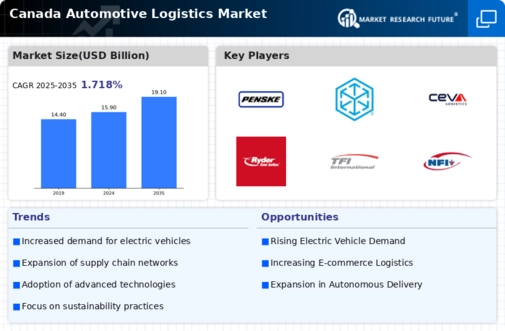The Canada Automotive Logistics Market is characterized by its dynamic nature and a growing emphasis on efficiency, technology, and customer service. Given the country's extensive automotive production capabilities and its strategic geographical location, many logistics providers compete for market share by offering specialized services tailored to the unique needs of automotive manufacturers and suppliers. This market is heavily influenced by shifts in consumer preferences, supply chain disruptions, and advancements in logistics technologies. Companies in this sector are not only focused on transportation and warehousing but are also innovating in areas such as just-in-time delivery, inventory management, and digital logistics solutions.
Therefore, firms operating in this market must constantly adapt to competitive pressures while striving to enhance service offerings and operational efficiency.Penske Logistics has established a robust presence in the Canada Automotive Logistics Market, leveraging its vast experience in supply chain management and transportation services. Renowned for its highly efficient operations, Penske Logistics offers a suite of logistics solutions that cater specifically to the automotive sector. Its strengths lie in the integration of advanced logistics technologies and seamless coordination of transportation and distribution services.
The company employs a customer-centric approach, emphasizing customization of services to meet the specific needs of automotive clients. This adaptability and focus on quality service significantly enhance its competitive position in the market. Moreover, its established network further strengthens its capability to support Canadian automotive manufacturers, ensuring timely delivery and reliable service.Panalpina has positioned itself as a competitive player in the Canada Automotive Logistics Market by providing a comprehensive range of logistics services tailored to the needs of the automotive industry.
The company specializes in air freight, ocean freight, and supply chain solutions, making it an integral service provider for automotive manufacturers and suppliers in Canada. Panalpina's strengths include its international reach combined with localized expertise, ensuring that clients benefit from global best practices while addressing specific regional demands. The company has also made strategic investments in technology to enhance visibility and efficiency in the supply chain. In recent years, Panalpina has engaged in various mergers and acquisitions, bolstering its market presence and expanding its capabilities, particularly in the automotive logistics sector.
These strategic moves have further solidified its competitive edge and optimized service offering within the Canadian automotive landscape.






















